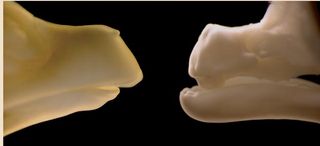Surprise: Chickens Can Grow Teeth

Chicken will grow teeth when pigs can fly.
Well, better start searching the skies for flying pork—scientists have discovered a mutant chicken with a full set of crocodile-like chompers.
The mutant chick, called Talpid, also had severe limb defects and died before hatching. It was discovered 50 years ago, but no one had ever examined its mouth until now.
The researchers recently created more Talpids by tweaking the genes of normal chickens to grow teeth.
"What we discovered were teeth similar to those of crocodiles—not surprising as birds are the closest living relatives of the reptile," said Mark Ferguson of the University of Manchester.
What happened
Around 300 million years ago, the ancestor of all modern vertebrates gave rise to two lineages, the mammals and the reptiles/birds. The oldest reptiles, such as crocodiles and alligators, had cone-shaped teeth. So did the earliest birds, called archosaurs.
Then, around 80 million years ago, modern birds emerged without teeth.
"So what would you expect bird teeth to look like? You would expect them to have teeth like their ancestors and their most closely related living relative," study co-author John Fallon of the University of Wisconsin told Live Science.
Indeed, Talpid's teeth are conical, much like an archosaur's and closely resembling the teeth of a baby alligator or crocodile, Fallon said. If the chick survived, the teeth would most likely reabsorb into the mouth.
The archosaurs had mouths similar in shape to a reptile's. It turns out that developing a beak caused birds to lose their teeth.
"The reason that birds lost their teeth is that in forming a beak, the two tissues that ‘talk' to each other to make a tooth become separated," Fallon said. "They can't have the conversation to make a tooth. In the mutant, these tissues are brought back together."
Make more mutants
The finding made scientists curious whether healthy chickens still possessed the 80-million-year-old genetic pathway for producing teeth.
By making a few changes to the expression of certain molecules in the pathway, the researchers were able to induce tooth growth in normal developing chickens. These teeth also looked like reptilian teeth and shared many of the same genetic traits, supporting the scientists' hypothesis. None of these chickens were allowed to hatch.
This is all good news for hockey players. A direct application of this research, Ferguson said, could be re-growing teeth in people who have lost them through accident or disease.
The research is detailed this week in the journal Current Biology.
Live Science newsletter
Stay up to date on the latest science news by signing up for our Essentials newsletter.
Most Popular

By Owen Jarus

By Sascha Pare

By Harry Baker

By Harry Baker